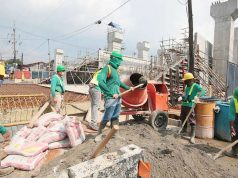THE Philippine Rice Research Institute (PhilRice) said Monday that its prospective budget of P621 million for next year represents a 5% decline in funding levels for this year.
“This 2021, the budget suggested to us by the DBM (Department of Budget and Management) is about P621 million. Nag decreased po ‘yan ng 5% (It’s reduced by 5%) relative to the previous year,” PhilRice Director John C. de Leon said during the hearing of the House committee on the North Luzon Growth Quadrangle.
The P621-million budget includes P267 million for personal services and P354 million for maintenance and other operating expenses. No funding is set aside for capital outlays.
Mr. De Leon was not able to explain why the 2021 budget is 5% lower, but said that the proposal is still being finalized.
“Hindi pa po final ‘yung aming tier 1 budget. Sabi ng DBM maybe they will add some more dahil po dinadagdagan nila kami ng tao but the (allotment for) personal services, hindi po. Kaya if titignan po natin yung aming budget, parang dumadami ‘yung tao, pero ‘yung budget hindi naman nadagdagan, (The tier 1 budget is not yet final. The DBM told us we might get more because we have increased staff, though personnel services funding has not increased)” he said.
For tier 2, PhilRice is seeking P6.03 million for 2021, P6.35 million for 2022 and P6.71 million for 2023 as “support to emergency food production and availability intervention.”
PhilRice hopes to increase the palay harvest and rice yields and to make more milled rice available for communities near its facilities, while preventing food scarcity.
“Sabi ko nga po hindi kami nagpo-produce ng rice but kung magpe-persist ‘yung COVID (coronavirus disease 2019) struggle, makatulong man lang kami sa mga barangay na malapit sa bawat station sa pamimigay nila ng rice (We are not rice producers ourselves but if the coronavirus persists we hope to at least supply rice to our host communities),” Mr. De Leon said.
PhilRice, an arm of the Department of Agriculture, is tasked with developing high-yielding and cost-reducing technologies for farmers.
Baguio Representative Mark O. Go expressed support for the budget proposal.
“I’m more interested na dagdagan ang pondo ninyo sa aspetong research and development. Doon talaga ‘yan eh diba. Kailangan natin ‘yung pondo na ‘yan para lalo tayong maka-develop ng mga variety ng mga bigas o rice na talagang mag-i-increase ng productivity, (I am more interested in adding funding to R&D because that’s the real mission… to develop rice varieties that will raise productivity)” he said.
Mr. De Leon added that as of this week, about two million bags of seed were distributed to beneficiaries of the Rice Competitiveness Enhancement Fund (RCEF).
RCEF aims to help farmers deal with the influx of imported rice as a result of the Rice Tariffication Law. The program has a budget of P10 billion annually between 2019 and 2024. — Genshen L. Espedido



